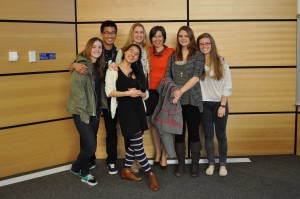Thank you to each of my students who took the time to complete a student evaluation of teaching this year. I value hearing from each of you, and every year your feedback helps me to become a better teacher. As I explained here, I’m writing reflections on the qualitative and quantitative feedback I received from each of my courses.
Psych 208: Special Topics
Overall, I thought this course was pretty smooth. Over the past four years I’ve developed a clearer vision for what this course is (see the syllabus), and I think that’s reflected in greater coherence, greater integration across in-class teaching methods, content, and learning objectives. Learning appraisals are in decent shape (although could probably use some refreshment in the coming year). As I have matured, I have matured this course.
After such self-assessment, I was pleased to note that students rated this course more positively than any previous iteration, right on par with my other more traditional courses (check out the quantitative data here). Reading the qualitative evaluations was almost overwhelming. Student after student noted how useful this course was, how much they applied these concepts to their everyday life, how they built skills they’d take with them into future courses and their careers. I am absolutely blown away by what people said about this course. When I first envisioned this course, I wanted it to be useful. So much of psychology (particularly social psychology) can improve our lives, and that’s exactly what I dreamed this course would help people do: apply our amazing research to improve their lives. To that end, numerous students wrote things like,
“I found myself always referencing the course subject matter to my friends and applying it within my own life”, “this has been one of the most beneficial classes of my university career,” and “this will be one of those courses that I look back on knowing that it was a good use of my time” – even if they noted they were about to graduate.
All of this positivity was despite (or because of?) the extent to which this course challenged students in various ways (e.g., “not an easy A”) yet was perceived as valuable (e.g., “the course project on group work is such a valuable skill that students need”). The usefulness of our course material got through to these students, and I’m absolutely thrilled!
Given these positive comments, I think it’s worthwhile to note that as I’ve matured (with) this course, there’s one key tweak I made in 2012 that I emphasized even more in 2013. During the first week, I am very explicit about the collaborative, applied, interactive nature of this course. I invite people to explore with me some ways of learning that are, for some people, uncomfortable and new. I also invite people who aren’t up for such exploration at this time to choose a different section or course, with no hard feelings. Along with better development of the curriculum and assessments, I think this tweak goes a long way toward student-course-instructor fit.
One area for growth that was noted a few times in the qualitative data was lack of clarity about learning assessment requirements. In my view, the handouts and LOs I give to students pretty clearly map on to my rubrics and exams. But there’s obviously a disconnect: a small yet larger proportion of students than in any of my other courses report lack of clarity for what to expect from grading. Moreover, my “fairness of evaluations” rating was the only UMI across all my 2012/2013 courses to fall below 4 out of 5. To remedy this disconnect, I have a couple of ideas: First, I will consider giving—up front—my rubrics for all components to the assignment. A couple of students suggested this, and I think it will help. Second, I will consider ways to give more advice for the exams, especially the midterm. One option would be to give a list of the short answer questions, a subset of which will appear on the exam (will this increase learning? If so, great! Will this increase the mean and/or reduce variance? If so, stress!).
[One of the challenges that I face (that’s not exactly popular with students, in my experience) is that attempts to change anything to do with grading run this risk of inflating the mean and/or changing the distribution of grades. Like all faculty in my department, I am bound by departmental requirements to have a mean around 65% and a standard deviation around 14% in all 100 and 200 level courses. Therefore, interventions that increase the mean or shrink the SD present real concerns that force me to confront this reality: any improvement in clarity might simultaneously require an increase in difficulty.]
Quite a few students mentioned enjoying the readings from one book, but finding the book that drew from a sport psychology perspective a bit less helpful and/or easily applied to academic life. Many of the readings will change in 2013/2014, largely because many of the chapters I currently rely on are out-of-date and must be changed anyway. Therefore, it’s a great opportunity to re-think the whole set of readings. I will be making every effort to get the custom course-pack down to one publisher, ideally with less of an emphasis on sport. Given the current offerings I’ve seen, I think that’s possible. I’ll also be thoughtfully considering the length of readings, as a (small) group of students mentioned feeling like there was too much to read.
Overall, in my view and the students’, this offering was the most successful iteration of Psyc 208 to date!

 Follow
Follow


